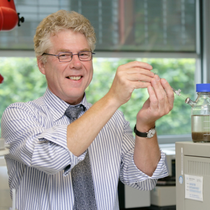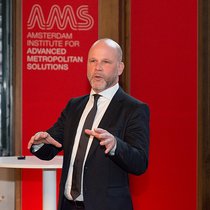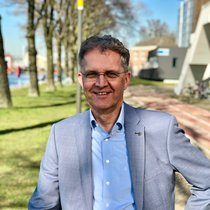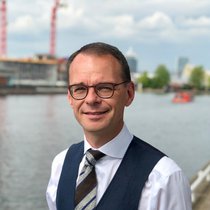The need for climate-resilient water harvesting
The impact of climate change is visible everywhere. For the metropole region Amsterdam, the climate impact on the water sector is observed in more drought periods and increased saltwater intrusion. This will pressurize the demand for more drinking water in the near future.
Suppose the Metropolitan Region Amsterdam will execute their extensive construction plans for future housing. In that case, the local water company, Waternet, expects that the drinking water supply will no longer meet the demand within 5-10 years (Waternet 2021). In their forecast, Toekomstvisie drinkwater Deel 1, 2021, Waternet expects that the resource availability will be sufficient, but that the purification and transport capacity will need to increase significantly. In addition, climate change, the energy transition, and the biodiversity crisis will make the drinking water provision even more complicated.
“To make urban green spaces drought resilient, municipalities need to develop strategies for decentralized circular water systems.”
Willie van den Broek
Program Developer
As a result, new methods for circular water need to be developed. In this project, we focus on urban water functions that have not been prioritized as the first to meet their demand, such as trees, urban green spaces, parks or open spaces that contribute to a healthy environment for citizens and, thereby, maintain biodiversity. First, we must identify alternative water sources like stormwater, local wastewater treatment and reuse, surface water use, or saline canal water. Secondly, we must develop methods to collect, store, combine and access these local urban sources. Finally, we need to demonstrate more efficient use for existing water applications.
Making use of the urban sewage systems
Amsterdam intends to prepare for future droughts periods by accessing new urban water sources for greenery functions. Greenery functions contribute to healthy living for citizens. This project investigates the possibility of accessing water harvesting in urban sewage systems. During droughts, the urban sewage systems are expected to act as a reliable and available source of fresh water by quantity, not quality. Therefore, new concepts need to be developed that allow water mining from urban sewage systems that can extract a suitable water quality for greenery functions and maybe also for urban agriculture functions. The research questions will focus on suitable water extraction technologies and solutions to process the remaining brine in a circular way.
“Water harvesting from urban sewers may be the resilient solution for fresh water supply during longer lasting drought periods for urban delta cities all over the world.”
Arjen van Nieuwenhuijzen
AMS Industry PI
Details of the AquaConnect Demonstrator project
The aim of this project is to demonstrate water resilience innovations for urban greenery functions in periods of droughts. Building the demonstrator will gain experience in designing and practically implementing water-resilient innovations in an urban context. Here it is important that:
- It is shown that such an innovation is technically possible.
- All stakeholders are involved in providing feedback on social and policy issues of the innovation.
- Incorporate the circularity aspect of the innovation: how to deal with potential residue fractions (concentrates, brine fraction).
- Investigate the governance, organization, and economic viability of these kinds of innovations.
Method:
- Design and demonstrate a concept to harvest water from a sewer system in Amsterdam at the Marineterrein, an experimental area for urban innovations.
- The concept will use direct nanofiltration membrane technology to extract water from the sewer, probably with an additional preprocessing step.
- A mass balance analysis for the whole city will be made to show that this approach is scalable for urban applications.
- Investigation of the circularity of the residue (concentrate/brine).
- Perform a SWOT analysis on decentralized water mining in the urban context.
Deliverables:
- A semi-full-scale mobile demonstration plant at the Marineterrein Amsterdam, possibly applicable at other sites like Oosterpark and Vondelpark.
- A report describing results and discussion of efficient water use for greenery in the urban Amsterdam area.
- Digital demonstration model for the urban area under investigation to simulate future scenarios (smart grid).
- A decision support mechanism to decide on water transport to further away locations or involve water purification activities for nearby water users.

Aquaconnect Consortium
| Duration: |
|
| Related Information: |






